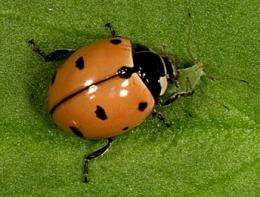Plants may benefit from aphid warning pheromone

(PhysOrg.com) -- If your building has 10 false fire alarms one morning, it is human nature to ignore it when it goes off for the 11th time.
Similarly, when aphids are raised on plants genetically engineered to emit a compound that warns surrounding aphids of a predator, they become accustomed to the chemical and no longer respond to it -- even when a predator is present, according to Cornell and Boyce Thompson Institute (BTI) researchers reporting Aug. 3 in an online edition of the Proceedings of the National Academy of Sciences.
Under normal circumstances, when a ladybug captures and bites into an aphid, the victim releases an alarm pheromone called beta-farnesene, which prompts nearby aphids to walk away or drop off the plant. Researchers are interested in protecting plants from aphids through genetically engineered crops that produce beta-farnesene or through traditional breeding methods that cross crops with plants -- such as some wild and cultivated potatoes and peppermint -- that naturally produce the pheromone.
The findings have implications for controlling aphids in crops, which could be engineered to make aphids unresponsive to warnings of ladybugs and other predators, making them easy prey.
But, as this study shows, "simply engineering plants to produce beta-farnesene will not make them resistant," said Georg Jander, an associate scientist at BTI on Cornell's Ithaca campus and a senior author of the paper with Robert Raguso, a Cornell professor of neurobiology and behavior. "When we put ladybugs into the mix, the aphids that are habituated to alarm pheromone get eaten more by ladybugs," Jander added.
In the study, aphids reared continuously on genetically engineered Arabidopsis thaliana plants that produced beta-farnesene became habituated to the pheromone within three generations and no longer responded to the compound, even though they still produced it. The habituated aphids did produce more progeny, perhaps because they expended less energy on running away and could focus on feeding more when compared with normal aphids, said Jander. Still, normal aphids had a higher survival rate in the presence of predators and would likely outcompete the habituated aphids in a natural setting.
The study also revealed that 15 percent of the genes in normal aphids displayed altered gene expression within 30 minutes of exposure to beta-farnesene, but "aphids that have been growing on alarm pheromone plants don't show this altered gene expression response," said Jander.
The results reveal a systemic response to the pheromone. "Being afraid is not just about running away, it changes the physiology of the aphid," said Jander. "But these gene expression changes don't happen with the habituated aphids, so somehow the signaling pathway is altered."
Provided by Cornell University
















